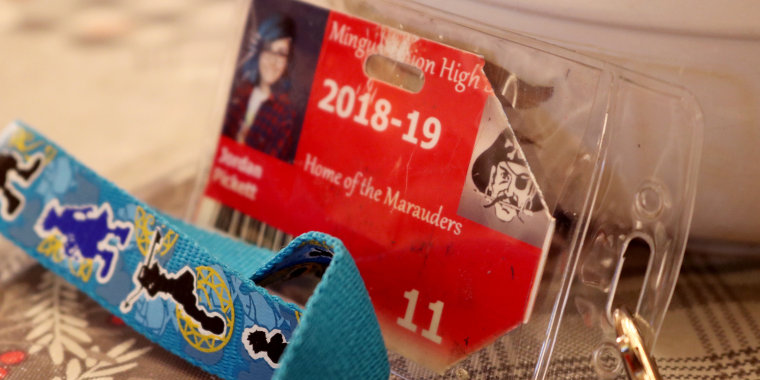At the start of the school year, Jordan Pickett received a red ID badge from Mingus Union High School in Cottonwood, Arizona. Like her classmates, Jordan was familiar with carrying an ID. Everyone has one, and each one is color-coded: Freshmen and sophomores carry red ones, while juniors and seniors carry gray ones.
But this year, there was a change. Students had to keep their badges visible. And any upperclassman who was underperforming had to wear a red badge.
“It didn’t seem right,” Jennifer Lansman, Jordan's mom, told TODAY.

Last year, Jordan missed a lot of school for doctors' appointments for anemia, and she fell behind in some classes. That’s why she had a red badge. She understood being behind meant she didn’t receive the same privileges as other students. But she worried when the badges made it easier for students to call those with red badges dumb or stupid.
“It bothered Jordan immediately. The bullying wasn’t necessarily directed at her personally. It was something she was upset that her friends were going through," Lansman said.
So, Jordan, 17, and her friend Jonah Ray, 16, also a junior with a red badge, decided to talk to the school board. In September, the pair asked the board to reconsider the policy.
“They told them their concerns about the red badges and how bullying was happening,” Lansman said. “My daughter is not exactly the outspoken, loud type. So for her to go and do that, it was a very big step.”
The school board never responded to the requests, and then the ACLU of Arizona sent a letter to the district on Dec. 28.
“The District’s scarlet badge policy in which it publicly identifies and shames underperforming students, does not bear a rational relationship to a legitimate educational interest,” Kathleen Brody, legal director for the ACLU of Arizona, wrote in the letter.
The school district’s attorney, Susan Segal, responded with her own letter, which she shared with TODAY.
“The District denies that it has violated any laws or rights of the students,” she wrote.
Segal told TODAY, “The district continues to be examining this policy, and it may change.”
While Lansman doesn’t believe the policy was meant to be punitive, it had unexpected consequences.
“There isn’t any reason for anyone other than the administration to know what students’ grades are or if they are behind,” she said. “Jordan and Jonah don’t want anyone to walk into school with an immediate label.”

Experts agree that such a policy can be detrimental.
“(This is) flying in the face of research,” Dr. Deborah Gilboa, a parenting expert, told TODAY. “It is damaging to students, and it is unlikely to reach any reasonable goal.”
Gilboa added that embarrassing children never encourages behavioral change, and it also creates a hostile environment.
“You open up a culture in school where shame is viable,” she said. “This is bullying. It is repetitive, and it is intentionally causing pain from a place of social power.”
She worries that the policy encourages students to bully their peers but thinks a bigger problem occurs when teachers see the badges. Say a student isn’t great at math and science but excels at writing and language arts. When the language arts teacher sees the red badge, he or she knows the child is failing in some way and might treat the student differently.
“You get that disappointed look from the one teacher that is proud of you,” she said. “It leads to more opportunities for disenfranchisement.”
What’s more, she said that such a policy would do little to actually change the undesirable behaviors.
“This allows the school to say we are doing something but doesn’t encourage them to solve the problem,” Gilboa explains. “There are no built-in solutions.”
Simply pointing out a student has a problem doesn’t help them solve it. It might also make students feel afraid to ask for help.
“It is likely to disenfranchise the students from solving the problem,” she said.
Lansman says that Jordan and Jonah simply want a policy that allows everyone to be seen as equal.
“I was and am very proud of her. I am proud of Jonah,” she said. “They both put themselves on the line, and that is hard to do at any age.”
Related video: